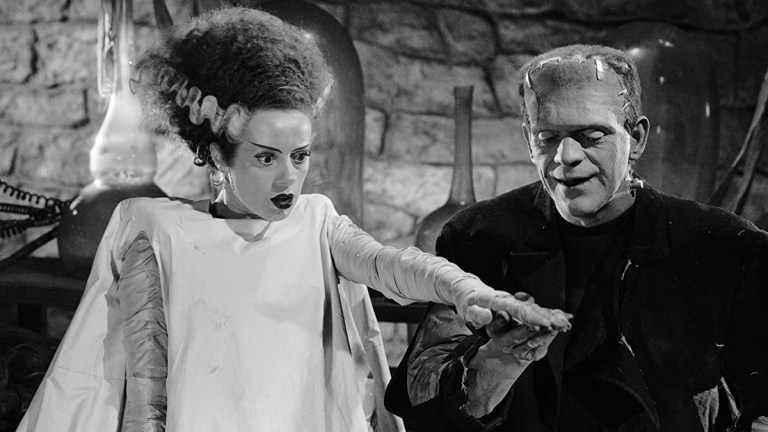Bride of Frankenstein Remake Still Happening at Universal
Universal’s Bride of Frankenstein remake apparently has new signs of life, according to writer David Koepp.

Bride of Frankenstein was long set for a major remake movie treatment from Universal as part of the “Dark Universe,” a continuity-unified Marvel-esque movie franchise for which the exorbitantly-produced Tom Cruise-headlined 2017 remake of The Mummy was designed as the kick off. Of course, that movie flopped spectacularly, derailing the Dark Universe plans, leaving Bride at the proverbial pre-production altar. However, said Bride remake may still have a chance to scream on the big screen.
David Koepp, a veteran screenwriter who previously took a turn—as did several other scribes—on a rewrite of Universal’s Dark-Universe-intended Bride of Frankenstein script, divulged that the remake is… well, alive, and looking for a director. In an interview with Collider, Koepp dispelled the notion that Bride was taken off Universal’s developmental slate, revealing that a combination of circumstances from the implosion of the Dark Universe and a COVID-19 lockdown yielded him an opportunity to revive and fine-tune the script. As Koepp states:
“That was one thing I did during quarantine – I brought back Bride of Frankenstein into a place where I kind of always wanted it to be. Universal was very gracious to let me try again. Because they had geared up and shut down famously in the Dark Universe fiasco. Well, not fiasco, but disappointment. So, I have a version now and they have a version that we all really like. I think they’re talking to directors now.”
Said Dark Universe disappointment, director Alex Kurtzman’s 2017 remake of The Mummy, brandished a $120 million budget, going on to earn only $80 million domestic. While international markets were more fruitful, yielding $329 million, bringing the film’s worldwide gross to $409 million, the total fell significantly short against an estimated $450 million break-even point. Ultimately, even with the perpetually-bankable Tom Cruise atop the marquee, The Mummy left Universal an estimated $60-100 million in the red after additional expenses. The fiasco was even shared by Koepp, who was one of six Hollywood heavies who worked on the screenplay.
Naturally, the boondoggle of an endeavor left would-be entry Bride of Frankenstein in an awkward position, with once-promising plans derailed for formerly-appointed director Bill Condon (Beauty and the Beast, Twilight: Breaking Dawn) as the film was reportedly eyeing Angelina Jolie to headline, presumably as the titular revived spouse, opposite the famous neck-bolts-rocking literary monster, who was to be played by Javier Bardem. Consequently, the film was postponed by the time the ignominious box office run of The Mummy wrapped.
However, Universal would salvage some of the Dark Universe slate, starting with The Invisible Man, which got a major makeover that saw the studio team with the horror maestros at Blumhouse to conjure a more narrative-focused and budget-friendly remake of the classic film. The result was director Leigh Whannell’s The Invisible Man, a horror outing put through a contemporary-topical lens, focused on a terrorized headliner in Elisabeth Moss. The film, released this past February, grossed $123.2 million worldwide off a microscopic (compared to The Mummy,) budget of $7 million. Thus, despite its small scale, the film actually made money—during a pandemic, no less.
Consequently, the scaled-back, character-driven Invisible Man model has become a bellwether strategy that Koepp’s reworked Bride of Frankenstein will utilize. While it remains to be seen if the script will similarly interpret the classic story with modern-parlance concepts like domestic violence and gaslighting, Koepp confirms that this Bride will be anything but an obscenely-budgeted Dark Universe movie spectacle. As he explains:
“It’s not the great big, $150 million extravaganza with giant movie stars. It’s not as scaled down as Invisible Man but much more reasonable, doable thing, with, I think, a really cool idea and it’s all present day.”
Additionally, Koepp praises Universal—for which he’s been a longtime consultant—for its current post-Dark-Universe approach and display of attributes that are rare for monolithic corporations: self-reflection and the ability to recognize missteps, musing, “There aren’t a lot of New Coke moments where they go, ‘This is not as we hoped. We’re going to stop and go off on this other direction.’”
Yet, the reinvention process will contrast dramatically with Bride of Frankenstein, which is a completely different animal of a franchise; one indelibly linked to iconic imagery from director James Whale’s 1935 Universal sequel film, specifically a screaming Elsa Lanchester’s white-streaked shock-top. Yet, while it may not be as amenable to the same kind of modernization as Invisible Man, Koepp—who’s worked on franchise-launching classics like Jurassic Park, Mission: Impossible and Spider-Man–has the experience to successfully embrace this new ethos.